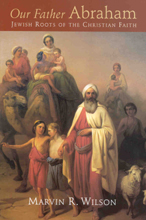Another difficulty we have is that we don’t understand the customs that were common knowledge to the writers and early readers of the Gospels. Even the translators of the Bible often have the same difficulty.
Such a misunderstanding has for example led to the common practice of Christians blessing the food before eating a meal. While not harmful, the practice has no foundation in Jesus’ actions or teaching. But for centuries Christians read passages like the following (KJV):
Matt. 26:26 – And as they were eating, Jesus took bread, and blessed it, and brake it, and gave it to the disciples, and said, Take, eat; this is my body.
Luke 24:30 – And it came to pass, as he sat at meat with them, he took bread, and blessed it, and brake, and gave to them.
The word “it” simply isn’t in the Greek text and thankfully many modern translations, such as the NIV have properly translated these verses. But the custom of blessing the food had long since been established. The following quote from Our Father Abraham: Jewish Roots of the Christian Faith by Marvin R. Wilson explains the Jewish custom regarding blessings (prayers) for food.[1]
“Unlike the practice of most Western Christians today, in Bible times the Hebrew people did not see the need to bless food, drink, or other material things. In prayer they focused only on blessing God, the Creator and Giver. The Gospels indicate that Jesus followed this same custom (e.g., note the NIV translation of Matt. 26:26 and Luke 24:30), one commanded in the Torah: “When you have eaten and are satisfied, praise the LORD your God for the good land he has given you” (Deut. 8:10). The Lord alone was worthy of receiving the blessing and praise as divine Provider. As we pointed out in the previous chapter, the Hebrew term berakhot (singular berakhah) means blessings. Yechiel Eckstein comments: “The berakhah does not transfer holiness to the object itself, but rather entitles us to partake of the world’s pleasure… We give thanks to the Lord and testify thereby that the earth is his and we are but its caretakers.” The following ancient blessing used in Judaism as grace before meals reflects the above point: Barukh attah adonai elohenu melekh ha-olam ha-motzi lehem min ha-aretz, “Blessed are you, LORD our God, King of the universe, who brings forth bread from the earth.” The ancient Hebrews would never have thought of blessing what they ate. The idea would have been totally foreign to them; it would also have been an insult, of sorts, to God. If everything God created was “very good” (Gen. 1:31), why should one imply that it is really unholy and profane? The postbiblical notion that one needed to sanctify, cleanse, or purify what God had already created and declared to be good would be strange theology to the biblical writers. It suggests that food and drink, in and of themselves, are unacceptable gifts until suddenly made holy through prayer.”
 Our Father Abraham: Jewish Roots of the Christian Faith has questions at the end of each chapter so you can review or test yourself on the material if you so desire. We list here a few of the questions to give you an idea of what you will learn from the book:
Our Father Abraham: Jewish Roots of the Christian Faith has questions at the end of each chapter so you can review or test yourself on the material if you so desire. We list here a few of the questions to give you an idea of what you will learn from the book:
- What Jewish holidays do we know Jesus observed?
- Jesus states that his intent was not to “abolish” or “destroy” the Law of Israel, but to “fulfill” it (Matt. 5:17). What light does rabbinic literature shed on understanding what Jesus meant by these words?
- What is the origin and meaning of the word Amen?
- In Bible times, what was the most important quality for being a good scholar?
The book contains nearly 500 questions, which gives you an idea of the breadth of the knowledge you will gain as you read it. This should be required reading for any Christian interested in his or her Jewish heritage.
- [1] For a review of Wilson’s book, see David Pileggi, “Marvin Wilson’s Our Father Abraham: Jewish Roots of the Christian Faith.”—JP ↩




Comments 1
Excellent! I’ll be buying the book shortly.